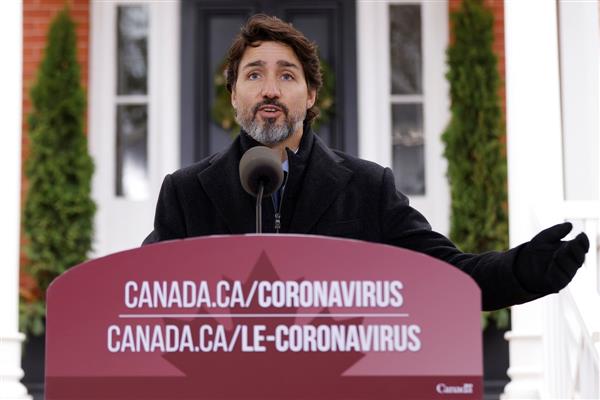Ottawa, November 20
Prime Minister Justin Trudeau said on Friday that Canada’s hospital system could be overwhelmed by a possible quadrupling of new COVID-19 cases by year end as its biggest city Toronto prepared to impose a lockdown.
Trudeau implored Canadians to stay home as much as possible as a second wave of the novel coronavirus rips across the country, forcing several of the 10 provinces to reimpose curbs on movement and businesses. Cases continue to spike and authorities complain some people are being more careless about taking precautions.
“A normal Christmas is quite frankly right out of the question,” Trudeau said. Earlier, Chief Public Health Officer Theresa Tam said in the worst-case scenario, a spike to 60,000 daily cases, would occur if people became more sociable. Even if current restrictions on gatherings are maintained, new daily cases will jump to over 20,000 by December 31 compared with less than 5,000 now.
“Cases across the country are spiking massively … we’re really at risk of seeing caseload go up and hospitals get overwhelmed,” said a clearly upset Trudeau.
He dismissed the idea of Ottawa invoking emergency powers to reintroduce the kind of widespread national shutdown that provinces imposed earlier in the year, saying “I’m not looking to bring in a federal hammer to try and do things.”
However, Ontario Premier Doug Ford announced on Friday that Toronto — Canada’s most populous city and the heart of the financial system — as well as the nearby region of Peel would enter into lockdown on Monday.
The lockdown measures ban all indoor social gatherings.
Restaurants are allowed to offer exclusively takeout and delivery and most retail stores are permitted curbside pickup only for a minimum of 28 days, according to a government release.
“The situation is extremely serious and further action is required to avoid the worst-case scenario,” Ford said at a press briefing.
Officials predict that by November 30, the total death toll could be between 11,870 and 12,120, with the total cases between 3,66,500 and 3,78,600. Canada has recorded a total of 3,15,751 cases and 11,265 deaths so far.
Separately on Friday, a federal official said Canada expects to receive six million doses of Pfizer and Moderna’s COVID-19 vaccines by March 31, 2021, though when the shots can be used will depend on regulatory approval.
Iain Stewart, president of the Public Health Agency of Canada, told a parliamentary committee that because the vaccines were new, manufacturers needed to scale up to meet the overall demand.
“All countries are interested in the very first vaccines, and the companies are trying to distribute out to multiple countries at the same time, so the amounts start out small and then they build over the course of the coming year,” he said. 




 Driving Naari Programme launched in Chandigarh
Driving Naari Programme launched in Chandigarh






























